

February 9 – 15: “How do our stories lie?”
 ITW Member Brian C. Poole says: “At heart all storytellers are liars.” This week, ITW Members Ryan Quinn, Ken Oxman, Susan Froetschel, Lisa Von Biela, Alexandra Sokoloff, Mike Pace, Jamie Mason, Merry Jones, Jean Heller and Lisa Unger will discuss how our stories lie!
ITW Member Brian C. Poole says: “At heart all storytellers are liars.” This week, ITW Members Ryan Quinn, Ken Oxman, Susan Froetschel, Lisa Von Biela, Alexandra Sokoloff, Mike Pace, Jamie Mason, Merry Jones, Jean Heller and Lisa Unger will discuss how our stories lie!
~~~~~
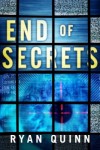 A native of Alaska, Ryan Quinn was an NCAA champion and an all-American skier while at the University of Utah. He worked for five years in New York’s book-publishing industry before moving to Los Angeles, where he writes and trains for marathons. Quinn’s first novel, The Fall, was a finalist in the 2013 International Book Awards. For more, please visit his website.
A native of Alaska, Ryan Quinn was an NCAA champion and an all-American skier while at the University of Utah. He worked for five years in New York’s book-publishing industry before moving to Los Angeles, where he writes and trains for marathons. Quinn’s first novel, The Fall, was a finalist in the 2013 International Book Awards. For more, please visit his website.
 Lisa von Biela worked in Information Technology for 25 years, then dropped out to attend the University of Minnesota Law School, graduating magna cum laude in 2009. She now practices law in Seattle, Washington. Lisa began writing short, dark fiction just after the turn of the century. Her first publication appeared in The Edge in 2002. She went on to publish a number of short works in various small press venues, including Gothic.net, Twilight Times, Dark Animus, AfterburnSF, and more. She is the author of the novels The Genesis Code and The Janus Legacy, as well as the novella Ash and Bone.
Lisa von Biela worked in Information Technology for 25 years, then dropped out to attend the University of Minnesota Law School, graduating magna cum laude in 2009. She now practices law in Seattle, Washington. Lisa began writing short, dark fiction just after the turn of the century. Her first publication appeared in The Edge in 2002. She went on to publish a number of short works in various small press venues, including Gothic.net, Twilight Times, Dark Animus, AfterburnSF, and more. She is the author of the novels The Genesis Code and The Janus Legacy, as well as the novella Ash and Bone.
 Jamie Mason was born in Oklahoma City, but grew up in Washington, DC. She’s most often reading and writing, but in the life left over, she enjoys films, Formula 1 racing, football, traveling, and, conversely, staying at home. Jamie lives with her husband and two daughters in the mountains of North Carolina, where she’s written her novels, Monday’s Lie and Three Graves Full.
Jamie Mason was born in Oklahoma City, but grew up in Washington, DC. She’s most often reading and writing, but in the life left over, she enjoys films, Formula 1 racing, football, traveling, and, conversely, staying at home. Jamie lives with her husband and two daughters in the mountains of North Carolina, where she’s written her novels, Monday’s Lie and Three Graves Full.
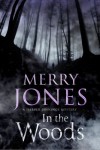 Merry Jones is the author of the Harper Jennings thrillers (SUMMER SESSION, BEHIND THE WALLS, WINTER BREAK, OUTSIDE EDEN, IN THE WOODS), the Elle Harrison novels (THE TROUBLE WITH CHARLIE, ELECTIVE PROCEDURES), the Zoe Hayes mysteries (THE NANNY MURDERS, THE RIVER KILLINGS, THE DEADLY NEIGHBORS, THE BORROWED AND BLUE MURDERS), as well as several humor books (including I LOVE HIM, BUT…) and non-fiction books (including BIRTHMOTHERS: Women who relinquished babies for adoption tell their stories.) She has also written articles for various magazines (including GLAMOUR) and short stories (including Bliss, published in the anthology LIAR LIAR).
Merry Jones is the author of the Harper Jennings thrillers (SUMMER SESSION, BEHIND THE WALLS, WINTER BREAK, OUTSIDE EDEN, IN THE WOODS), the Elle Harrison novels (THE TROUBLE WITH CHARLIE, ELECTIVE PROCEDURES), the Zoe Hayes mysteries (THE NANNY MURDERS, THE RIVER KILLINGS, THE DEADLY NEIGHBORS, THE BORROWED AND BLUE MURDERS), as well as several humor books (including I LOVE HIM, BUT…) and non-fiction books (including BIRTHMOTHERS: Women who relinquished babies for adoption tell their stories.) She has also written articles for various magazines (including GLAMOUR) and short stories (including Bliss, published in the anthology LIAR LIAR).
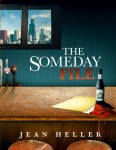 Most of Jean Heller’s career was as an investigative and projects reporter and editor in New York City, Washington, D.C. and St. Petersburg Florida. Her career as a novelist began in the 1990s with the publication of the thrillers, “Maximum Impact” and “Handyman” by St. Martin’s Press. Then life intervened and postponed her new book, “The Someday File,” to publication in late 2014. Jean has won the Worth Bingham Prize, the Polk Award, and is an eight-time Pulitzer Prize nominee.
Most of Jean Heller’s career was as an investigative and projects reporter and editor in New York City, Washington, D.C. and St. Petersburg Florida. Her career as a novelist began in the 1990s with the publication of the thrillers, “Maximum Impact” and “Handyman” by St. Martin’s Press. Then life intervened and postponed her new book, “The Someday File,” to publication in late 2014. Jean has won the Worth Bingham Prize, the Polk Award, and is an eight-time Pulitzer Prize nominee.
 Mike Pace is a former Assistant U.S. Attorney for Washington D.C. He taught elementary school in Washington’s inner city, and later served as litigation partner in a large Washington firm. His latest thriller, ONE TO GO, has been called “blisteringly good,” “pulse pounding,” “explosive,” and a “post-modern take on early Stephen King,” by such acclaimed authors as Steve Berry, Doug Preston, Gayle Lynds, and Jon Land. He lives in Southern Maryland on the Chesapeake Bay.
Mike Pace is a former Assistant U.S. Attorney for Washington D.C. He taught elementary school in Washington’s inner city, and later served as litigation partner in a large Washington firm. His latest thriller, ONE TO GO, has been called “blisteringly good,” “pulse pounding,” “explosive,” and a “post-modern take on early Stephen King,” by such acclaimed authors as Steve Berry, Doug Preston, Gayle Lynds, and Jon Land. He lives in Southern Maryland on the Chesapeake Bay.
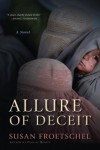 Susan Froetschel is the author of five mystery novels, including Allure of Deceit, published this month by Seventh Street Books. The novel is about a remote Afghan village that is astounded to be regarded as recipients of charitable giving from groups based overseas. Her previous novel, Fear of Beauty, received the 2014 Youth Literature Award from the Middle East Outreach Council and was nominated for the 2014 Mary Higgins Clark Award, Mystery Writers of America.
Susan Froetschel is the author of five mystery novels, including Allure of Deceit, published this month by Seventh Street Books. The novel is about a remote Afghan village that is astounded to be regarded as recipients of charitable giving from groups based overseas. Her previous novel, Fear of Beauty, received the 2014 Youth Literature Award from the Middle East Outreach Council and was nominated for the 2014 Mary Higgins Clark Award, Mystery Writers of America.
 New York Times and international bestselling author Lisa Unger‘s accolades include selections as an International Thriller Writers “Best Novel” finalist, a Florida Book Award winner, a Bookspan “International Book of the Month”, a Prix Polar International Award finalist, and a Target “Emerging Author.” Her writing has been hailed as “stellar” (USA Today), “arresting and meaningful” (Washington Post) with “gripping narrative and evocative, muscular prose” (Associated Press.) Her novels have been named top picks by the Today Show, Good Morning America, Walmart Book Club, Harper’s Bazaar, Family Circle, Good Housekeeping, Washington Life, Publishers Weekly, New York Daily News, Indie Next and Amazon (Top Ten Thriller of the Year.) More than 1.8 million copies of her books have been sold in 26 languages. She currently lives in Florida.
New York Times and international bestselling author Lisa Unger‘s accolades include selections as an International Thriller Writers “Best Novel” finalist, a Florida Book Award winner, a Bookspan “International Book of the Month”, a Prix Polar International Award finalist, and a Target “Emerging Author.” Her writing has been hailed as “stellar” (USA Today), “arresting and meaningful” (Washington Post) with “gripping narrative and evocative, muscular prose” (Associated Press.) Her novels have been named top picks by the Today Show, Good Morning America, Walmart Book Club, Harper’s Bazaar, Family Circle, Good Housekeeping, Washington Life, Publishers Weekly, New York Daily News, Indie Next and Amazon (Top Ten Thriller of the Year.) More than 1.8 million copies of her books have been sold in 26 languages. She currently lives in Florida.
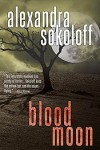 Alexandra Sokoloff is the bestselling, Thriller Award-winning and Bram Stoker and Anthony Award-nominated author of ten supernatural, paranormal and crime thrillers. The New York Times has called her “a daughter of Mary Shelley” and her books “Some of the most original and freshly unnerving work in the genre.” As a screenwriter she has sold original suspense and horror scripts and written novel adaptations for numerous Hollywood studios (Sony, Fox, Disney, Miramax), for producers such as Michael Bay, David Heyman, Laura Ziskin and Neal Moritz.
Alexandra Sokoloff is the bestselling, Thriller Award-winning and Bram Stoker and Anthony Award-nominated author of ten supernatural, paranormal and crime thrillers. The New York Times has called her “a daughter of Mary Shelley” and her books “Some of the most original and freshly unnerving work in the genre.” As a screenwriter she has sold original suspense and horror scripts and written novel adaptations for numerous Hollywood studios (Sony, Fox, Disney, Miramax), for producers such as Michael Bay, David Heyman, Laura Ziskin and Neal Moritz.
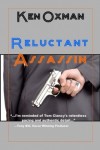 Ken Oxman’s life has been an adventure, from jumping off a cliff with an early hang glider to having a pistol stuck in his mouth in a sleazy bar in Cartagena, Colombia. From fighting a dangerous sea alone to almost being sold as a white slave in Mozambique, to being taken in the night from a beautiful pomegranate grove motel and dumped in an Indian village deep inland along the shores of Lake Maracaibo, Venezuela. He has lived adventures and hopes readers might get that and enjoy reading them in his book. He has been a cadet officer in the British Merchant navy, a qualified teacher of English & drama, a stage actor & director. He directed a series of Noel Coward plays for NPR, wrote & presented for the BBC, wrote & presented weekly commentaries for Connecticut Public Radio/NPR. He has worked as a public speaking coach and sailing instructor and helps his wife Patricia with her antiques business.
Ken Oxman’s life has been an adventure, from jumping off a cliff with an early hang glider to having a pistol stuck in his mouth in a sleazy bar in Cartagena, Colombia. From fighting a dangerous sea alone to almost being sold as a white slave in Mozambique, to being taken in the night from a beautiful pomegranate grove motel and dumped in an Indian village deep inland along the shores of Lake Maracaibo, Venezuela. He has lived adventures and hopes readers might get that and enjoy reading them in his book. He has been a cadet officer in the British Merchant navy, a qualified teacher of English & drama, a stage actor & director. He directed a series of Noel Coward plays for NPR, wrote & presented for the BBC, wrote & presented weekly commentaries for Connecticut Public Radio/NPR. He has worked as a public speaking coach and sailing instructor and helps his wife Patricia with her antiques business.
- LAST GIRL MISSING with K.L. Murphy - July 25, 2024
- CHILD OF DUST with Yigal Zur - July 25, 2024
- THE RAVENWOOD CONSPIRACY with Michael Siverling - July 19, 2024
